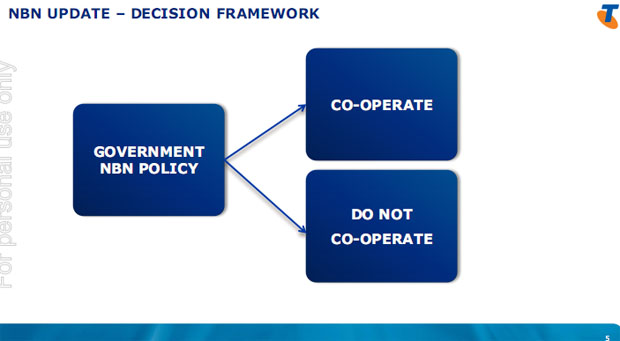Telstra vote on Labor not Lib policy: Thodey

Telstra shareholders will be asked to consider the company's $11 billion National Broadband Network agreement only based on what would happen if the NBN goes ahead, not on what might happen if the Coalition takes power and makes changes, according to Telstra CEO David Thodey.

The analyst slide used to explain how Telstra shareholders will be asked to vote.
(Credit: Telstra)
"It's important to remember that the NBN is government policy. And we will work within that policy framework. We are asking shareholders to vote on what we believe is best for Telstra within that policy framework, not on alternative government policies," Thoday told media and analysts this morning.
According to Shadow Communications Minister Malcolm Turnbull, should the Coalition win government at the next federal election, it would look to a mixture of technologies, with fibre-to-the-home in some places but fibre-to-the-node in the rest. He has indicated that the Coalition would not seek to dismantle parts of the NBN already constructed.
Thodey answered questions on specific parts of the agreement that would see the company lease infrastructure to NBN Co and migrate its customers onto the new network.
One significant clause in the contract prevents Telstra from promoting its own wireless broadband products as being a substitute for fibre. Thodey said this wouldn't prevent Telstra from promoting Next G or future Long Term Evolution products entirely.
"We will continue to develop and push wireless ... but in terms of this contract we want to get as many people to go onto the fibre as possible because we get paid for that," he said. "What we have agreed to do is to not actively promote wireless as a direct substitute to fixed broadband."
The CEO said he didn't expect this to impact much on the telco's revenue.
"This is a very small percentage of potential revenues going forward that we are excluding ourselves from going forward."
Thodey said the clause was also dependent on what Telstra's competitors were advertising, indicating that if its competitors were promoting wireless as an alternative to fibre, Telstra may be able to get out of the agreement. The telco's biggest competitor, Optus, was not yet able to comment when asked by ZDNet Australia as to whether it would also be precluded from pushing wireless as an alternative to the NBN as part of its $800 million agreement with the NBN Co.
On the Optus agreement, Thodey said he wasn't willing to compare the money offered to Optus with the Telstra deal.
"We don't compare ourselves to that deal, we've looked at the total package we have over the period," he said. "I'm not really interested in what Optus has got."
From now until the 18 October shareholder vote, Thodey said that the signing of the definitive agreement would give Telstra some minor payments for NBN Co to gain access to some pits and ducts as the roll-out progresses.
"We'll be able to get going with them and we will be able to receive some minor payments. So they can really get started with planning and design from today onwards," he said.